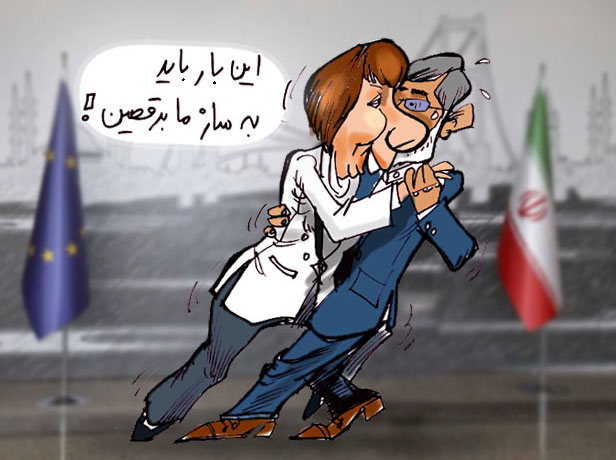 Nuclear negotiators Catherine Ashton & Saeed JaliliLaura Rozen of Al Monitor brings the latest inside information on the possibility of renewed nuclear talks between the 5+1 Powers (US, Britain, France, Germany, China, and Russia) and Iran:
Nuclear negotiators Catherine Ashton & Saeed JaliliLaura Rozen of Al Monitor brings the latest inside information on the possibility of renewed nuclear talks between the 5+1 Powers (US, Britain, France, Germany, China, and Russia) and Iran:
Diplomats from six world powers, following further unpublicized consultations in recent days, have decided to propose to Iran dates for holding a new round of nuclear talks as early as this month, diplomatic sources told Al-Monitor Monday. However, a meeting is not expected to materialize before January, they said.
Promising, right? Not really. The reality of the stalemate comes out in Rozen's very next paragraph:
Diplomats from five of the six nations in the so-called P5+1 also agreed in their latest consultation to “update” the package presented to Iran at a meeting in Baghdad last May, the diplomatic sources said, although they downplayed expectations for major changes to the package. In addition, one country, believed to be Russia, had not yet formally signed on to that decision, one expert briefed by the US administration told Al-Monitor Monday, adding that it was his understanding the dissenting nation wanted a more revamped, generous package.
Translation: the US and Europeans would like to give the Iranians one more chance to accept almost the same "stop, shut, and ship" plan that they insisted upon at the Moscow talks in June, the last high-level meeting and one that ended in a loud stalemate.
"Stop" means Iran has to halt enrichment of uranium to 20% --- still a level for civilian purposes, but one which could provide a platform for further development to 90%+ and military uses --- immediately. "Shut" is the closure of Iran's second uranium enrichment plant at Fordoo, opened in recent years to cover any threat that the primary plant at Natanz might be closed, say by Israeli military actions. "Ship" is the transfer of Iran's entire stock of 20% uranium outside the country.
A diplomat told Rozen, without going into specifics, that this is still the starting point for presentation to the Iranians: “The package needs a little bit of updating, as things have evolved since the package was defined, but nothing radical is to be expected."
But what do the Iranians get in return for acceptance of the three conditions? In Moscow, the US and Europeans offered nothing beyond the token concession of removal of sanctions on spare parts for aircraft --- regarded by Tehran not only as "peanuts for diamonds" but as an insult, given the spate of deadly plane crashes blamed on an aging fleet. Perhaps there might be further lifting of sanctions, perhaps there might be explicit recognition of Iran's right to enrich uranium to 5%. Perhaps.
In other words, Washington expected unilateral concessions from Iran. Talks could then proceed from that point.
The Iranian proposal at Moscow was discussion of both sides of the equation, with a staged plan linking the moves towards suspension of 20% enrichment to the full removal of sanctions. They repeated that offer publicly after the deadlock in Russia, and they probably took it to "back-channel" discussions with the US, as well as meetings with the 5+1's representative Catherine Ashton, this autumn.
There appears to have been no movement by either side from their positions, however. And so the "back=channel" talks also stalled, bringing us to today's latest posture.
Free from recognition of these details, or at least waving a pundit's wand to dismiss them, analysts put out columns with their road map to resolution. This morning Trita Parsi outlines, "Three Worries About the Next Nuclear Talks", none of which have to do with the existing obstacles: This time around it might be different. Fabricated or not, there is a sense that the end game is near."
Meanwhile, the scare stories take the place of meaningful discussion. The attempt by an unnamed intelligence service --- I have already placed my bet on which one --- to put out, through the gullible or compliant Associated Press, the "smoking graph" proving an imminent Iranian Bomb, has been embarrassingly exposed. However, that did not stop yesterday's spin, this time through Reuters, that the Iranians are trying to deceive the International Atomic Energy by "sanitising" nefarious nuclear activity at the Parchin military base.
Last month, Hillary Clinton declared, "We're looking to put together a presentation for the Iranians at the next meeting that does make it clear we’re running out of time, we’ve got to get serious, here are issues we are willing to discuss with you, but we expect reciprocity."
All of that is on the level, except the last three words. What is not being made explicit --- even in Rozen's revelations this morning --- is that the US does not expect reciprocity. It expects those unilateral concessions.
That offers a stark prospect for Tehran. The Islamic Republic has proclaimed loudly that it wants the renewed talks with the 5+1, accepts the January date, then it does so with the signal that it is willing to make the concessions.
Which is why I'm betting that next week, next month, and beyond January, we will be in a Groundhog's Day of this chatter --- and then the declared March "window" will close for the Iranian Presidential elections.
And then?